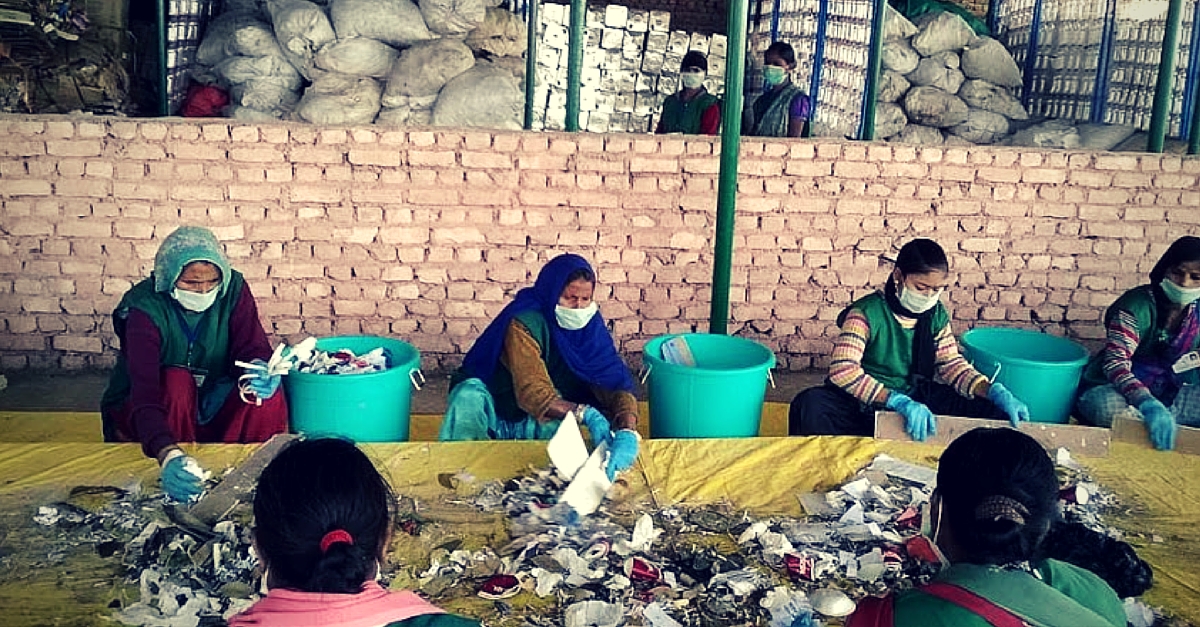E-Waste Pickers Now Have a Dignified, Safe and ‘Green’ Job!
Increasing economic growth and urbanisation are leading to more products being discarded, wastage and mountains of landfills. This NGO is working to help us dispose of waste more responsibly, improve the working conditions and lives of waste pickers, encourage recycling, and contribute to a cleaner environment.

Increasing economic growth and urbanisation are leading to more products being discarded, greater wastage and mountains of landfills. This NGO is working to help us dispose of waste more responsibly, improve the working conditions and lives of waste pickers, encourage recycling, and contribute to a cleaner environment.
Delhi-based NGO, Chintan Environmental Research and Action Group, recently received the 2015 United Nations Momentum for Change Award, in the Urban Poor category.
The award was for its initiative to train waste pickers to safely collect and dispose of electronic waste.

Khokun Hamid, who makes a living out of picking e-waste, received the award on behalf of Chintan.
“Chintan focuses on ensuring equitable and sustainable production and consumption of materials and improved disposal of waste. The main aim is to ensure ‘green jobs,’ where the urban poor who mainly earn a living out of picking waste, get security and dignity on the work front,” says Chitra Mukherjee, the Head of Programs for Chintan.
Since the focus is on waste pickers, Chintan works mainly with organisations of the urban poor, like rag pickers and kabaris. However, to see success, the organisation also has to work closely with policymakers, students, parents, teachers, municipality employees, elected representatives and, naturally, the police. Chintan’s initiatives are in the fields of research, campaigns, policy interventions, capacity building of recyclers, and creating awareness about the need for reducing consumption and better waste management among the middle and upper classes of society.
Chintan is one of the few organisations in India that is authorized to work with e-waste. In the past four years, it has managed to divert 25 tonnes of electronic waste material to recycling.

For starters, electronic waste has high recycle value and hence waste pickers are paid more for their involvement in segregation and disposal of electronics.
“In India, even electronic waste items are usually discarded as part of household waste. Unless the waste weighs at least three tonnes, formal recyclers do not take in electronic waste items. We, at Chintan, train the waste pickers to segregate these waste products, which are then stored in our facility till the required amount is reached and they can be sold to recyclers,” adds Chitra.
It may come as a surprise to many that India is the fifth largest producer of electronic waste. Methane emissions generated by electronic waste in landfills are 25 times more potent than carbon dioxide in trapping heat in the atmosphere. One of the many long term goals of Chintan is to encourage recycling.
If the informal waste sector also inculcates the repair and recycle process, people will hopefully stop buying more and more e-products, reducing the discarding of electronics to a large extent.

Organisations like Chintan remind the world that waste is as much about materials as it is about the people who handle waste and people who discard waste. In India, millions of poor people handle waste material, helping save public money and reduce greenhouse gases.
To make its programmes more effective, Chintan partners with Safai Sena, an association of waste pickers and waste recyclers.

Safai Sena is a registered group of waste pickers, doorstep waste collectors, small buyers, junk dealers, and all types of recyclers. The aim of this organisation is to make waste handling a ‘green’ job — one that is not only good for the local environment but the workers who handle waste as well. Waste handlers deserve to get respect and recognition for their work, work in a safe environment, and provide a good education for their children.
Safai Sena members works wearing masks, gloves and boots. They are looked after financially, taught how to become self-reliant and send their children to good government schools.

“Ever since Chintan was established in 1999, we have been working on a war footing to formalize the informal sector of waste management. As per statistics, in the past two decades, urban Indians, especially of the middle and affluent classes, have become fervent consumers. This has led to a leap in the demand for various products, which leads to a lot of wastage and puts intense pressure on the environment,” points out Chitra.
In almost all Indian cities, 1% of the population works in the informal sector of waste management and recycling. With the growing economy and changing consumption patterns, the ever-increasing number of discarded goods exposes waste workers to higher levels of pollution and dangerous toxins. With an increase in urbanization, the amount of waste generated will only increase and so will the number of people involved in handling waste, exposing more and more people to major risks to their health. There is indeed a very serious need to formalize this sector so that people handling waste work under more humane conditions.
For more information on Chintan, log onto their website.
Like this story? Or have something to share? Write to us: [email protected], or connect with us on Facebook and Twitter (@thebetterindia).
This story made me
- 97
- 121
- 89
- 167
Tell Us More
We bring stories straight from the heart of India, to inspire millions and create a wave of impact. Our positive movement is growing bigger everyday, and we would love for you to join it.
Please contribute whatever you can, every little penny helps our team in bringing you more stories that support dreams and spread hope.



















